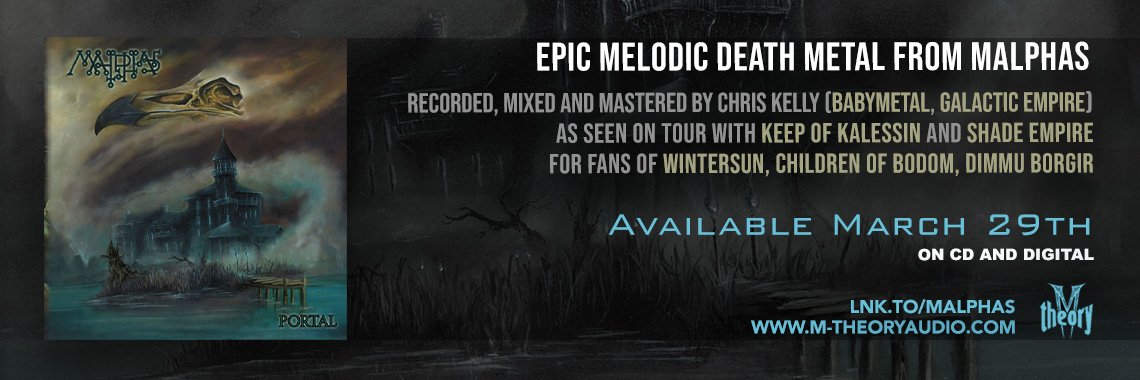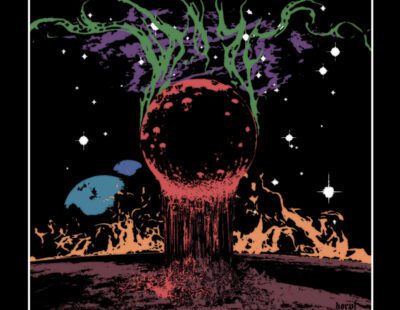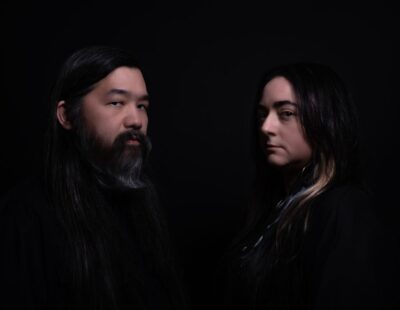
When listening to Vouna‘s first album, which is now three years old, the listener is overcome with a wash of synthesizer-forward black and doom metal, as mighty and ancient as the douglas firs which dot the Pacific Northwest to which artist and multi-instrumentalist Yianna Bekris calls home. But when faced with this project’s newest album, titled Atropos, we are instead presented with something new: though the grandeur remains the same (if larger), a less tragic character is replaced with thoughtful tension.
Atropos, the goddess of fate, here takes on the personification of human fragility and Bekris’ own thoughts on mortality.
“Death. Ever since I was a kid, I have been kind of anxious about it,” Bekris explains over Skype. “It’s this very inevitable thing. I picked the title because I wanted to express inevitability, and I think Atropos.. that’s what her role is. She cuts the thread, you know?”
On the new song “Grey Sky,” Bekris’ own fears and anxieties become a morose sound. Echoing classic funeral doom tenets, Vouna’s second album (and especially on this song) takes on a more matured quality; Bekris’ densely composed funeral march tells a tale of the sky opening to nothingness, a lack of peace in life and existence.
She sings:
The sun rises again
The clouds part again
I close my eyes to my reality
I will arise again
Though I will not find peace in this life
Listen to an exclusive pre-release stream of “Grey Skies” from Atropos and read an interview with Yianna Bekris below.
There is a shift in sound between the first release and Atropos, primarily in that the tragic character becomes more tense. Was this intentional?
Yeah, it was intentional. I wanted to create some type of tension, I don’t know if anxious is the right term, but I wanted to have clashing harmonies and things like that.
It’s a departure from the first album, which was harmonious and melodic in a way which was very tragic and spoke to the influences you had cited, so it’s a neat and very fast evolution for this project.
I guess it is! With the first album I’d written a lot of the riffs on the keyboard, and this one was more on the guitar, and always — with playing the guitar — I like when there are little dissonances. I don’t know if it was always intentional, and it was sometimes, but there were some times where it was unintentional, too.
I found the reference in the title Atropos, the goddess of fate, is something which fills me with a lot of anxiety. What were you looking to express specifically with this title and the concept which goes beneath the album?
I chose the album title after the album had been recorded. The album is about death and I didn’t do that on purpose, it just turned out that way… just kind of due to circumstances in my life, and the Pandemic contributed to that too. Death. Ever since I was a kid, I have been kind of anxious about it. It’s this very inevitable thing. I picked the title because I wanted to express inevitability, and I think Atropos… that’s what her role is. She cuts the thread, you know?
With this goddess cutting the thread of life and embracing fate, do you feel Vouna, too, expresses this type of fragility through its massive sound?
Yeah, I think that’s what I’m trying to convey. With this album I was trying to have this massive sound, but whenI was singing, or when there are acoustic instruments and you can hear fingers and things like that, I was trying to express that we as humans are this very small creature in this huge world, you know? It is a fragile place to be.
With this mixture of black metal, funeral doom metal, and folk-type music… when melding these together, what guides you to pick one over another when making these fusions?
It’s kind of like I just go with what I think is most appropriate for that part of the song. In “Grey Sky,” there’s the black metal section at the end. Originally it wasn’t a black metal section, but I just felt it was so anticlimactic to not have that there. I really wanted the end to be climactic, so just because the rest of the song is a doom song without black metal elements, I thought it would be a good contrast. I see all the different styles I meld as a tool to express the different emotions I’m trying to convey.
It is a difficult kind of equation, trying to figure out what part of the sound you want to use, and it’s all very tastefully done on this album. I can tell you spent a lot of time on it, and I understand you started composing and partially recording it back in 2019?
I did, yeah. It took me a long time. It’s a really long album and I really wanted to get it right, so I put a lot into the songs. I even taught the songs to my live band because it’s a different thing hearing a band playing something instead of layering something over a computer and listening back.
What was it like translating the older material to a live setting versus this simultaneous teaching your live band while creating the music?
It was definitely different. Everyone in my live band I didn’t actually know very well when we started playing together. I’d seen them playing around town and approached them about joining my band. It was very nerve wracking, for me, and it was nerve wracking to present these songs I wrote. In Vradiazei, I did a lot of the songwriting but with Eigenlicht it was a very collaborative project. It’s different when you write a thing from start to finish and give it to someone you don’t know very well. That was a much different experience after having toured together and played together and grown as a band. None of us have roles in the band that we had in previous bands. It was a lot more comfortable and the band picked up everything quickly. It was a much more comfortable experience.
Looking up the embers of your live band, there isn’t much information about them aside from stage names. Were they a part of the metal scene?
Yeah! Though there was one person who had just moved up here from Oakland.
I like it when information and mystique is controlled like that.
It wasn’t really my idea, it was my bandmates who go by their stage names because that’s what they wanted. I kind of wish I had a stage name sometimes since there is something really nice about being anonymous.
Do you find there are any struggles with being openly yourself and not anonymous with this kind of music?
I don’t think there are any struggles necessarily, really it’s just that people can see all the other bands I’ve been in. I guess I’ve never really been on social media much so it’s not like people are really going to find anything.
Ideally, would you want Vouna to speak for itself on its own, ro do you think it’s a culmination of your other artistic works?
I guess it is a culmination, but I don’t want people to have any preconceived notions. I guess my other bands haven’t been very big, but I don’t want people to have their perceptions painted by expectation.
With Atropos, obviously there is the element of fragility and the mammoth presence. How do you find yourself achieving the balance?
It’s honestly pretty difficult, but it’s also at the same time what I wanted with the project, which is why on this record I wanted the guitars to be heavier. I love synths, don’t get me wrong, but they have an ethereal quality no matter what. It’s a difficult thing to do. I mostly trhy to do it with the vocals and the guitars and all the other instruments, and the acoustic instruments are part of the fragile side of things.
You had mentioned the switch to guitar, and while you are an accomplished guitarist, what did you face while shifting the writing style?
It’s interesting because I actually think this album was easier to write than the first one for many different reasons, one of them being… I bought a synth for the first time and wanted to make synth music. I was trying to wrestle with digital recording software for the first time instead of just using Garageband. It’s easier for me to express myself on guitar, though. It wasn’t really a challenge for me… maybe the biggest one for having a solo project is not having anyone else to reflect on in the band. It’s easy for people to tune out of a long song. That was a big challenge.
When crafting this album — longer songs, different emotional character — what do you feel defines Vouna on Atropos rather than the previous album?
That’s an interesting question. I think the last album was very dynamic, but I think it grew. I’ve been able to mature and ripen the music, not like the first album was half-baked or anything. It was experimental, trying to record an album all on my own for the first time ever in all the years I’ve played music. This time it didn’t have that experimental feeling. I felt more like I knew what I was doing.
(Preorders are live now at Profound Lore Records.)







